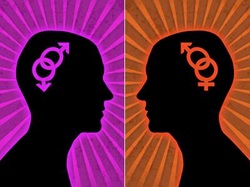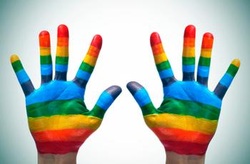
Levi
 Every scientist is a person. In understanding science through a history, philosophy, and sociology of science lens, we must always consider who scientists are and what may affect their biases in conducting their science. It is really odd then that we basically never hear of LGBT scientists in the historical media, and this is not because they did not exist. Levi
0 Comments
This project has been all about how science influences our perception of sexuality, but in this post I would like to talk about how the media and popular culture shape our viewpoints and beliefs. With the New Year coming up I want to explore what an awesome year it has been for LGBTQ rights, and how the media has begun to reflect the diversity and beauty of the society we live in today. All of these wonderful things have happened is 2013, but we still have a long way to go. I think one of the most noteworthy things that has happened this year in relation to this project is Olympic diver Tom Daley coming out as gay. Part of what Darwin believed is that people belong to higher “tiers” on the evolutionary pyramid, the top being the white heterosexual male this disproves everything Darwin believed. An Olympic athlete, the picture of fitness and discipline is gay, this disproves Darwin’s belief that one kind of evolutionary fitness is the only format that can thrive. These historical events this year make me realize the beauty in the diversity of humanity. I believe that our diversity is our true strength and the key to thriving is accepting the diversity that we have in our global community.
-Mary Well, if you watched the above, its kind of silly, and a little bit adorable/heartwarming at the end. But it does reveal a link here between gender norms and sexuality. A lot of people in the LGBT community experience pressure from their parents to follow the gender norms apparent in society - a source of much of the tension between parents and their LGBT children when they come out. But what does sexuality say of your child? Just because your child identifies with a specific LGBT group does not mean they have to have a certain personality. Like this video kind of jokes about, just because your boy is gay does not mean he cannot be your next major league ball player. In improving society's strict and detrimental gender norms, we should also consider removing the stigmas parents associate with their child's developing sexuality.
Levi  As someone who is involved in research in the field of animal behavior, I can see a modern turn towards inclusiveness even in the small slice of science that I work in.
This past summer I was involved in a project where we examined the sexual behaviors of gray tree frogs (Hyla versicolor). Typically sexual selection studies are male-centered, focused on what traits in the males are preferred by females, and considers female preference static and invariable. The project I was involved with over the summer, however, looked at the intricacies of female preference, which, as a result of a male-biased science, has received little attention in the past. Specifically, we were looking at what is called the terminal investment hypothesis. This is the idea that animals in varying condition will put different amount of resources towards reproduction vs. survival since animals vary in their amount of residual, or future, reproductive potential. Basically, this is the idea is that animals in worse condition or older age will put more resources towards reproduction than those in better condition or younger age since they have less of a chance to reproduce and pass on their genes in the future. This has been typically examined in males, where males of worse condition or old age put more resources towards sexual signalling so they seem just as attractive as better condition or younger males which may actually be of better quality. However, this could also be the case in females, where females are less choosy with their sexual preferences when they are older or in worse condition, taking on more risk of mating with low quality mates so that they can secure last-ditch reproductive opportunities. This is what we examined in the gray tree frog: does female choosiness vary with her age or body condition, both potential indicators of her residual reproductive potential? This specific study shows me that the scientific community is open to shifting towards more inclusive research interests, not allowing male biases to be as prevalent research topics such as these in animal behavior. This gives me hope that, at least in the scientific community, there is an openness to considering topics such as homosexuality in research. Reflecting on this past Thanksgiving and the recent loss of Nelson Mandela, I have more to be thankful for than the usual family, friends, and health...
As we live in an age of few true role models, I am thankful for men like Nelson Mandela, an iconic leader, civil rights giant, and advocate of peace. May his spirit continue to inspire those who value love and acceptance over dismissal and hate.
I am thankful for the amazing people I have met and continue to meet since I began college. My freshman seminar professor once told us that the world is full of friends you have yet to meet. He was absolutely right.
And lastly, I am thankful to be part of a changing society, and I am thankful to be able to see those changes as they come. Nelson Mandela once said, “Part of being optimistic is keeping one’s head pointed towards the sun, one’s feet moving forward.” As we approach a new year, may we always remember to be moving forward.
Chris America is one country in the world that is very hush-hush about sexuality. I believe that America fears human sexuality a bit and thus, fears when homosexuals try and express their sexuality (and rights for their sexual orientation) and when artists and musicians try to show their sexual side during their performances. Lately in the media, Miley Cyrus has been a major topic of talk. From her "raunchy and sexually-driven" performance of the "We Can't Stop" and Robin Thicke's "Blurred Lines" to her nude shot on top of a wrecking ball in her new music video. She has made it clear to the world that she has no regrets about any of her decisions. I am biased because I have been a fan for years of the talented star who is even younger than I am, but recently she brought up a very valid point. She mentions the very popular show Breaking Bad and the drugs involved-
"America is just so weird in what they think is right and wrong ... Like, I was watching Breaking Bad the other day, and they were cooking meth. I could literally cook meth because of that show. It's a how-to. And then they bleeped out the word 'fuck.' And I'm like, really? They killed a guy, and disintegrated his body in acid, but you're not allowed to say 'fuck?' It's like when they bleeped 'molly' at the [MTV Video Music Awards]. Look what I'm doing up here right now and you're going to bleep out 'molly'?" It just brought to my attention how America really does view sexuality as something that should not be public what-so-ever, but drugs can be talked about and shown all over TV as if nothing is wrong with it. Sexuality is a natural thing. Sex is natural. We need sex to survive. Since when do we need methamphetamines to survive? We don't, but it seems they are much more widely accepted on television than a little bit of sexual dancing (twerking) done by Miley. Maybe America should listen to Miss Cyrus and reevaluate what is right and what is wrong. Human sexuality, both heterosexual and homosexual, are natural processes and man-made psychoactive drugs are not. -Margeaux  Animals are very intriguing to me, and that is probably why I contributed so much about them in regards to sexuality science to the site. In my research, however, I found it so odd that so much of this behavior was just not being discussed in the general science community. In the documentary I watched, the study of homosexual behaviors in animals was described as "the science that dare not speak its name," as if this behavior was taboo in animals and deserved to be ignored. Why is it so astonishing that animals show homosexual behaviors? In animals, sex is not forbidden or dirty, it is the norm, something done often and in plain view. Unbounded by cultural perceptions like humans, it seems no wonder that animals partake in homosexual behavior for various reasons. This behavior may not be 'normal' to us, but then again what is normal?
Science beginning with Darwin has classified sexual behavior as purely reproductive in function. There is no room in scientific literature for sexual behavior that could not possibly result in reproduction, as is the case with homosexual behavior. But how do we know this does not offer a fitness advantage? In the animals I have seen, homosexual behaviors, however you define them, occur in a variety of contexts and for many purposes. In some cases it is beneficial for parenting, in others it seems to help maintain group social bonds, and in many cases we still do not know. How would these not offer advantages to animals? Surely the way to decipher what types of advantages these behaviors offer is not to remain quiet about them, letting the biases of scientists get in the way of understanding what is in come cases core behavior exhibited by animals. After all, if we cannot understand the basis of sexual behaviors in animals, how can we ever understand them in humans? Levi  On this site we often refer to how the sexual side of science is portrayed in the media. However, we rarely elaborate on that or really provide any such resources. Below I am going to provide a selection of common media sources I have found on the subject. I hope you can examine these and formulate an opinion of this media for yourself.
Popular Science: Could Scientists have Found a Gay Switch? National Geographic: Homosexual Activity Among Animals Stirs Debate Wikipedia: Animal Sexual Behavior SEED: The Effeminate Sheep and Other Problems with Darwinian Sexual Selection News Medical: 1500 Animal Species Practice Homosexuality YouTube: Let's Talk About Sex: The Science of Love YouTube: Why are there gay men? 60 Minutes: Exploring Sexual Orientation Levi  Over the past few weeks, I have taken numerous trips over to Conrad with Chris and Margeaux in order to gather information regarding the history of LGBT events and organizations at MSU. We have organized our findings into a time line which we feel accurately describes major events within the LGBT community here at MSU. In the beginning, I found the amount of information that was available on this subject slightly overwhelming. However, after spending some time sifting through folders filled with articles and newspapers, I began to get a sense of MSU’s history regarding the LGBT community. There were a few events in particular that stuck out to me as being the most influential. The first occurred in 1980, one of the years that Greek Week and Gay Pride week coincided on campus. Tensions between the two groups ran high throughout the week, coming to a head when, in order to mock the frat boys, all of the members of the gay community were told to wear “alligator shirts” and to dress as a stereotypical frat boy. The second noteworthy occasion occurred in 1982 when a member of the fraternity Delta Sigma Pi was removed from the fraternity after coming out as a gay. The president of the university stood behind the fraternity’s decision, claiming frats were not a part of the university and therefore not held to the same anti-discrimination policies as those of the university. After reading many stories similar to the ones outlined above, I am amazed at how far the university has come in response to the LGBT community in the past 30 or so years. The development and current existence of the LGBT resource center along with the evidence of changing attitudes throughout all of the Greek Community shows great promise for the reputation of our university in the future. I am so grateful for all of the changes that are contributing to MSU becoming a more accepting community for its students to be involved in.
Sarah We’ve all heard the age-old aphorism “Sticks and stones can break my bones, but words can never hurt me.” It was the popular response to any form of insult, a verbal riposte that should have effectively ended the exchange. When I was in elementary school, we were taught to report physical bullying but to ignore verbal attacks; in effect, it was the victim’s fault if they let the hurtful words get to them. Cases of physical bullying at my school were rare, but recess was practically a verbal sporting match. Nobody was safe, and the words were brutal. Every day, for whatever reason, somebody would get called a “fag”, a “homo”, a “retard”, or a “gay-wad” (my computer has no idea how to style that last one, and neither do I). Though many of the kids who freely hurled these insults associated them with being a loser, few knew exactly what they meant. I went to elementary school in the mid-1990s, before major anti-hate campaigns were launched on television let alone the internet. There was nobody there to explain to us seven year-olds that by calling somebody a “fag” or a “retard”, we were a.) implying in the rudest way possible that the person on the receiving end was either homosexual or mentally handicapped and b.) that we were implying that being a homosexual or mentally handicapped was something to be scorned and ridiculed. The epithet “faggot” has a particularly nasty etymology; historically, faggots were groups of sticks tied together and used for large fires, and homosexuals were often burned as heretics or "abominations" in the past (homosexuality sadly continues to be punishable by death in certain countries). Not exactly something every elementary school student knows.
A more updated version of the aphorism should go “Sticks and stones can break my bones, but words will stay with me for life.” This works both ways. Many people my age continue to use these hurtful words simply because they have always used them and are unwilling to stop, despite knowing now exactly what they mean. Maybe its because they know what the words mean and what kind of connotation they bring when used that the insults have thus “stayed” with them. At this age, most people also know that epithets have lasting impacts on people; the internet is full of stories of people who committed suicide after enduring long bouts of verbal bullying. Maya Angelou once said that people may not remember what you said or what you did, but they do remember how you made them feel. In this way, hurtful words stay with those who have had to endure them for life. Chris |